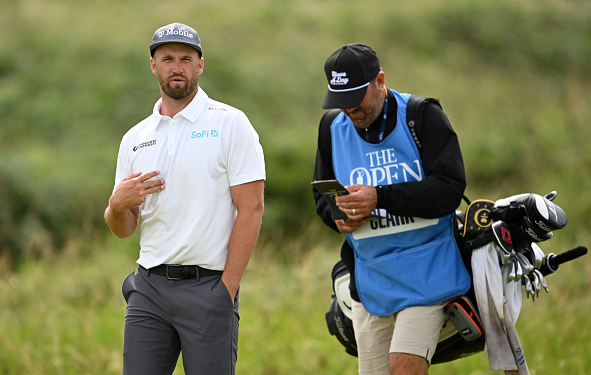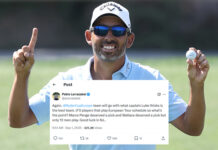
In a move that reeks of sanctimonious grandstanding, Oakmont Country Club has drawn widespread criticism for its decision to publicly shame PGA Tour star Wyndham Clark ahead of the 2025 British Open.
The prestigious Pittsburgh-area club banned Clark from its property after he damaged lockers in a moment of frustration during the 2025 U.S. Open, where he narrowly missed the cut.
While Clark’s outburst was undeniably a mistake, the former U.S. Open champion promptly apologized, expressed deep regret, and committed to covering the damages.
Yet, Oakmont’s leadership, led by club president John Lynch, chose to escalate the situation by broadcasting the ban in a letter to members, conveniently leaked to the press just days before Clark teed off at Royal Portrush. The timing and execution of this announcement have sparked accusations of bad faith, with critics — including Clark’s detractors and even NBC broadcasters — slamming Oakmont for what appears to be a calculated attempt to garner publicity or sabotage Clark’s focus at a critical moment in his season.
Clark’s incident at Oakmont was far from commendable. After bogeying his final hole to miss the U.S. Open cut by a single stroke, the 31-year-old vented his frustration by damaging two lockers in the club’s historic locker room.

The act, captured in viral social media photos, was a low point in a challenging 2025 season for Clark, who had also drawn attention for throwing his driver and damaging a tee sign at the PGA Championship earlier in the year. But Clark didn’t shy away from accountability. At the Travelers Championship the following week, he owned up to his actions, stating, “I made a mistake that I deeply regret. I’m very sorry for what happened,” and expressed his desire to move forward for the sake of Oakmont, the USGA, and his own career. He also committed to paying for the damages, a “no-brainer” in his words, and expressed willingness to meet the club’s other requirements, including a charitable contribution and counseling sessions.
One might expect a club of Oakmont’s stature, which has hosted a record 10 U.S. Opens and an anchor site for the USGA, to handle such matters with discretion and class. Instead, Oakmont’s leadership chose to air its grievances in a manner that many have called unnecessarily punitive and self-serving.
The letter from Lynch, first reported by Golf Digest on July 16, 2025, outlined Clark’s ban and the conditions for his reinstatement, including full repayment for damages, a charitable donation, and mandatory counseling or anger management. While these stipulations are reasonable, the decision to publicize the ban just before the British Open raised eyebrows.
Sources close to Clark revealed his surprise and disappointment that what he hoped would remain a private matter was instead splashed across headlines, forcing him to address the controversy during one of golf’s biggest weeks.
The backlash against Oakmont was swift and bipartisan. Even those critical of Clark’s behavior found the club’s actions distasteful.
Others pointed out that Clark wasn’t alone in his frustration at the notoriously brutal Oakmont course, with players like Shane Lowry openly cursing the venue during the same event.
Yet, only Clark faced such a public reprimand.

NBC’s coverage of the British Open didn’t hold back either, with Golf Channel commentators questioning Oakmont’s motives and labeling the public announcement as “pretentious” and “unnecessarily vindictive.”
On Sunday, amid the final round of the Open Championship, NBC highlighted Clark’s prior apology and his willingness to make amends, suggesting that Oakmont’s decision to amplify the issue seemed more about flexing its authority than seeking justice.
The timing of the announcement — just days before Clark’s opening round at Royal Portrush — fueled speculation that Oakmont intended to disrupt his preparation or capitalize on the controversy for publicity. The club, set to host the U.S. Open again in 2033, has long prided itself on its storied history and elite status in the golfing world. But this move painted Oakmont as petty and vindictive, more concerned with its image than with fostering resolution.
Clark himself noted the unfortunate timing, saying, “We were hoping it was going to be private,” and expressed his desire to “give back to the community” and show that the incident “was not a reflection of who I am.”
Despite the off-course drama, Clark demonstrated remarkable resilience at the 2025 British Open. Battling the weight of the controversy, he delivered his best major performance since his win in 2023, carding rounds of 76-66-66-65 to finish tied for fourth at 11-under par. His final-round 65 was a testament to his mental fortitude, silencing critics and proving that he could rise above Oakmont’s attempt to cast a shadow over his week.
“I’m just trying to get past it,” Clark told reporters at Royal Portrush. “I want the best for Oakmont, the USGA, and myself.”

His strong finish not only marked his best result in a major in 2025 but also underscored his ability to channel adversity into performance.
Oakmont’s decision to publicly shame Clark stands in stark contrast to the golfer’s efforts to make amends and move forward. By choosing to broadcast the ban, the club invited scrutiny of its own motives, with many in the golfing world questioning whether it was truly about accountability or simply a power play to assert dominance.
The incident has sparked a broader conversation about how golf’s elite institutions handle player misconduct and whether public shaming is an appropriate response to a resolvable issue. As one Oakmont member reportedly fumed, “I don’t know who the f— they think they are,” suggesting that even within its own ranks, the club’s actions have stirred discontent.
In the end, Clark emerged from the controversy with his head held high, letting his clubs do the talking at Royal Portrush. Oakmont, on the other hand, may have won the battle for headlines but lost the war for respect. The club’s decision to prioritize publicity over discretion has left a bitter taste in the mouths of fans, players, and pundits alike, tarnishing its reputation as a bastion of golfing tradition.
As Clark looks ahead to the rest of the season, including his pursuit of a Ryder Cup spot and FedEx Cup contention, Oakmont would do well to reflect on its own conduct and consider whether its actions reflect the values it claims to uphold.





































